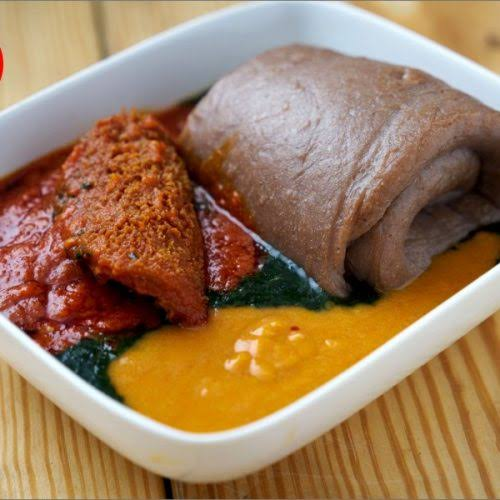My mother never joked with feeding us well as little boys—my brother and I. Her mother, on the other hand, took it even more seriously and would pump us at every chance. That's how I discovered the magical wonders of pounded yam and vegetable soup.

Pounded yam and vegetable soup with assorted pieces of meat
Grandma used to run a big restaurant where she mostly sold hot swallow foods and soup and other foods like rice and yam. Her best seller was between the pounded yam and amala (made with plantain or yam flour). And, man, she used to sell A LOT with those two. And it was in one of our first visits as kids to her restaurant that I realised what I had been missing all my life.
Whenever my mom took us to visit grandma at her restaurant, it was like everything else would stand still just for my brother and to be treated as princes. Immediately, grandma would order her workers to set a table for her grandchildren and get us hot, sumptuous wraps of pounded yam, which Yorùbá people call "iyán." In conjunction with the smoking hot pounded yam, she would mesmerise our noses with ẹ̀fọ́ riro, a Yorùbá vegetable type of soup.
I wonder if this only happens to me, but whenever I eat too much and my stomach feels like it could burst if you poke it, I would begin to beg God to forgive me of eating without control and save my life. This often happens with foods like pounded yam and Àmàlà, my absolute favourite swallow foods.
If I am being honest, it's difficult to pick between àmàlà and iyán. If you know you want a "yes" from me, just prepare any of them, and I can give you half of my kingdom.
Àmàlà goes very well with àbùlà for me, with goat meat on top. Hot, black àmàlà made with Yorùbá love in conjunction with peppery àbùlà [grinded beans + tomatoes and pepper + jute leaves (ewedu)]. The way I am describing it is even making me want to go in search for it, but I shall maintain composure!

Gbegiri (grinded beans) in yellow, ewedu (jute leaves) in green, and tomatoes + pepper in red
The thing about iyán is that it is not commonly made in households. It requires a pestle and mortar and a lot of pounding of cooked yam to get the right texture and feel. Just about everybody can pound yam in my family. Fortunately, my grandma had all her children work with her at some point, and then I learnt from my mother.
My mother is surprising really good at pounding yam, even at 54 years. And, of course, her culinary desterity is world-class grade. So exquisite, so delicious every time.
Anyway, as I was saying...
My favourite dishes happen to be pounded yam and vegetable soup [iyán + ẹ̀fọ́ riro] and àmàlà and àbùlà. Just about any type of meat will go, but goat meat tends to call me more sometimes. Then just top everything with cold juice. And of course, the soups have to be spicy and have a tiny pieces of fish and ponmo (cow meat
When Yorùbá people say spicy, they really mean make-you-sweat-and-beg-for-water type of spicy. Yes. That's how we roll. No, it's not just a stereotype that we generally eat spicy foods.
Inspired by the #septemberinleo Day 12
Posted Using InLeo Alpha